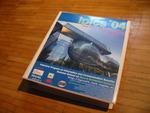Second week of IPICS04 has been done too.
Monday (26th of July):
Bart Preneel (Katholieke Universiteit Leuven, Belgium) was giving “An introduction to cryptology, Part II” in 5 units. Main topics were MAC, PKI and GSM-security. Herbert Leitold (Secure Information Technology Center, Austria) was talking about ‘Electronic voting in Europe’ and it’s main problems. Afterswards Karl Scheibelhofer (Secure Information and Communication Foundation, Austria) give us some information about ‘Java Crypto Solutions for Embedded Systems’ like J2ME and IAIK Java Crypto Products.
Tuesday (27th of July):
Keith Martin (Royal Holloway, University of London, UK) held interactive 4 units on ‘Electronic commerce’. Main topics were B2C, B2B and clients vs. managers point of view – no real news for me. Eugen Brenner (Graz University of Technology, Austria) held a lecture on ‘Writing secure code’. It’s content has been development process, threat modeling, risk mitigation, security testing, root causes and secure coding techniques.
Start 3-Days Industrial Seminar
Wednesday (28th of July):
Stefan Mangard, Elisabeth Oswald and Vincent Rijmen (Graz University of Technology, Austria) were talking about ‘Side channel attacks’ and ‘Defense against side channel attacks’ including demonstrations. Taling about SPA (Simple Power Attaks), DPA (Differntial Power Attacks) and Timing Attacks was very interesting!
Erkay Savas (Sabanci University, Istanbul, Turkey) hold a lecture on ‘Sensor Network Security’ – including topics like SNEP, microTESLA and PKC in sensor networks.
Johannes Wolkerstorfer and Martin Feldhofer (Graz University of Technology, Austria) were talking about ‘Authentication with RFID Tags’.
Thursday (29th of July)
Bart Preneel (Katholieke Universiteit Leuven, Belgium) was talking about GSM-, WLAN-, UMTS- and bluetooth-security in his talk ‘Mobile communications security’. Very interesting!
Ernst Haselsteiner from Philips Semiconductors (Austria) was talking about ‘Common Criteria Evaluation of a Smart Card Cryptographic Library’.
Afterwards Dieter Gollmann (TU Hamburg-Harburg, Germany) give us an introduction to ‘Evaluating Protocols’.
Quite interesting was the lecture from Holger Bock (Infineon Technologies, Austria) about ‘Random Numbers in Security Applications’. Main topics were Kalmogorov Complexity and systems like RANDy, Protego and SLE66C(X)xxxP and some more theory.
IPICS Presentation Day – Friday (30th of July)
Very detailed information on ‘Computer architecture for pervasive security’ like as “fast cryptographic processing” and “attack resistance” was telling us Ruby LEE from Princeton University (USA).
Bart Preenel (Katholieke Universiteit Leuven, Belgium) told us some news on ‘Trends in cryptological research: The European Network of Excellence in Cryptology’ – again very interesting!
Dieter Gollmann (TU Hamburg-Harburg, Germany) was talking about TCP (Trusted Computing Base) , MLS (Multi-level security) and TCPA/TCG in his talk ‘Trusted Computer Platform’.
An introduction to the topic bometry gave us Reinhard POSCH (Chief Information Office, Austria) in “Biometry and Identification”.
Conclusion: IPICS04 was very interesting. I got many new keywords I could/can google for. Organisation of the event was also absolutely great. Thanks to Prof. Karl C. Posch!
BTW: I’ve done some urlblogging during the second week of IPICS04 – it’s available online: http://del.icio.us/mika/ipics04

 Now I was searching for other zsh-addicts via
Now I was searching for other zsh-addicts via 



